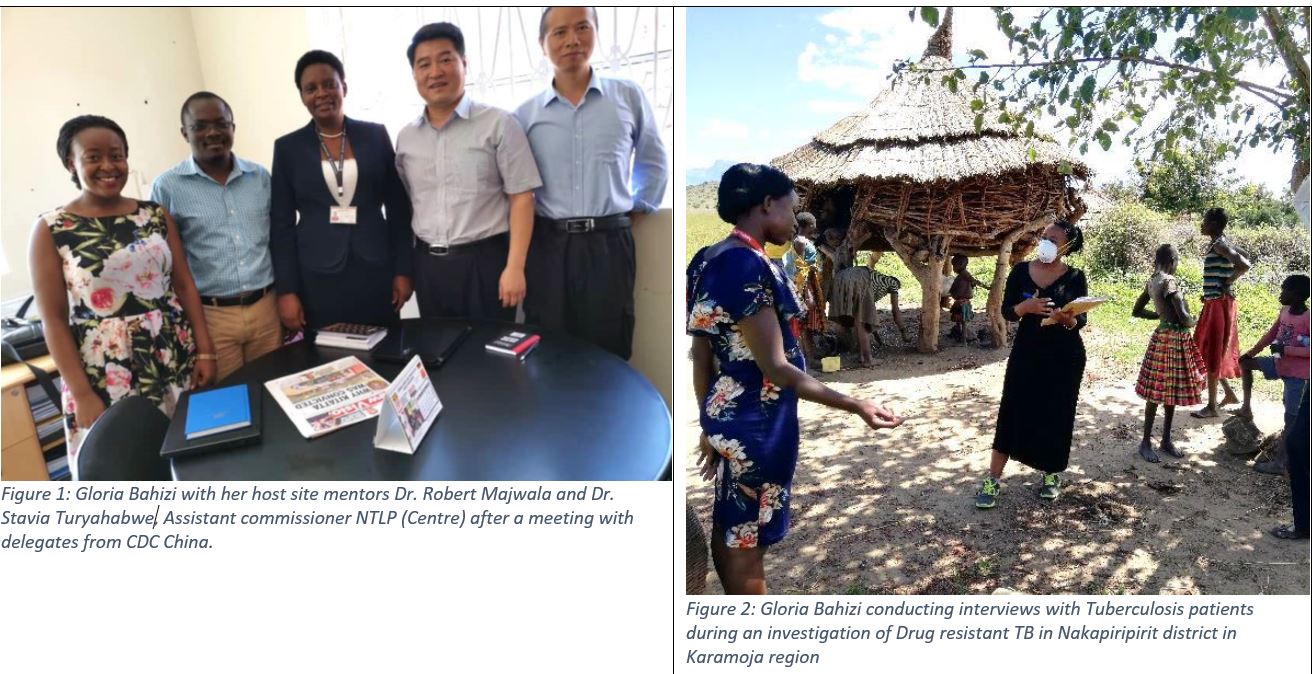 |
Gloria Bahizi
|
||||||||||||||||||||||||
ABOUT THE FELLOWGloria Bahizi is a Field epidemiologist and holds a Master of Public Health from Makerere University, School of Public Health. During my time as a Public health Fellow, I was attached at the National Tuberculosis and Leprosy Division (NTLD), Ministry of Health. I conceptualized, designed and implemented Tuberculosis research projects like Epidemiology of Rifampicin resistant TB patients in Uganda. I was able to carry out investigations to guide programme decisions. I have extensive knowledge in HIV/AIDS and Tuberculosis patient care capacity building and health systems strengthening. Through this experience, I developed planning, budgeting, mentorship, report writing and leadership skills. I have built competence in designing research protocols, investigating disease outbreaks including Ebola and the COVID-19 response, data management and analysis, report, abstract, presentation, manuscript writing and publishing skills for articles in the local newspapers, national bulletins and international journals. Achievements at the Host Site
|
|||||||||||||||||||||||||
| Cascade step | All prisoners
N=6803 |
In-House Testing & Treatment
N=5922 |
Referral Testing & Treatment
N=881 |
| HIV Testing Completeness | 87% (5924) | 91% (5380) | 62% (544) |
| HIV-Positive | 12% (717/5924) | 10% (546/5380) | 31% (171/544) |
| Treatment Initiation Completeness | 70% (503/717) | 79% (429/546) | 43% (74/171) |
| Viral Load Testing Completeness | 30% (151/503) | 32% (137/429) | 10% (8/74) |
| Viral Load Suppression | 92% (139/151) | 98% (135/137) | 50% (4/8) |
Barriers in prisons operating both models included inadequate clinic space, staffing, and staff training, and uncoordinated prisoner releases and transfers (often before ART initiation or VL testing; limited paper records inaccessible to future providers). For referral-model prisons, limited outside organization funding and staffing, security challenges in transporting prisoners to outside clinics, and limited opportunities for outside organization staff to enter prisons were also identified.
Conclusion: In-house services yielded better performance than referral. Both had gaps in VL testing. Limited human resources and uncoordinated prisoner transfers and releases were barriers to comprehensive HIV services. We recommend in-house testing and ART in all prisons where possible, and electronic medical records to improve continuity of care.
Key Skills Lessons Learnt
The PHFP has presented an opportunity for hands on learning experience in field epidemiology and public health leadership. The skills and competencies acquired from this practical experience and mentorship with supervision from technical experts in the Ministry of Health and the fellowship program are invaluable. During the fellowship, I learnt and developed the following skills:
- Outbreak Investigation; National disease outbreak investigations and response as part of the MOH National rapid Response Team (NRRT) and the National Task Force (NTF) to establish causes of outbreaks and inform early prevention and control interventions. With this we were able to participate in the COVID-19 response supporting different regions
- Scientific writing; Manuscripts, Abstracts, Policy Briefs and Newspaper article which created avenues to share information with the public and National stakeholders building presentation and networking skills
- Leadership skills in rapid response and control of disease outbreaks, analysis and evaluation of national surveillance systems, quality improvement and program implementation
- Evaluation and analysis of data from surveillance systems to generate information for action to improve program implementation strategies
Next Steps
- I hope to further my career in the field of Epidemiology through service with the Ministry of Health, National and international agencies that will allow me to leverage my knowledge, experiences and skills obtained.
- international agencies that will allow me to leverage my knowledge, experiences and skills obtained.

